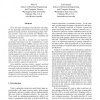Free Online Productivity Tools
i2Speak
i2Symbol
i2OCR
iTex2Img
iWeb2Print
iWeb2Shot
i2Type
iPdf2Split
iPdf2Merge
i2Bopomofo
i2Arabic
i2Style
i2Image
i2PDF
iLatex2Rtf
Sci2ools
127
click to vote
RTCSA
2007
IEEE
2007
IEEE
Modeling Real-time Garbage Collection Cost
Given the major advantages of productivity and safety, the use of garbage collection (GC) in real-time systems has gained increasing attention. Guaranteeing garbage collection activities’ worst-case execution time (WCET) is necessary for a real-time system to perform scheduling and schedulability analysis. This paper describes a detailed GC cost model for incremental mark-and-sweep GC exemplified by a modified Boehm-Demers-Weiser (BDW) collector. The GC cost model computes the WCET for garbage collection in terms of (1) the performance of collector operations and (2) the garbage collection load offered by a real-time task. Separating these aspects is a step along the road to an engineering approach to garbage collection in real-time systems, allowing prediction of system behavior from knowledge of component behavior and environmental specifications. The model incorporates the cost of write barriers that are needed to support incremental GC. To be useful for real-time systems, a m...
Related Content
| Added | 04 Jun 2010 |
| Updated | 04 Jun 2010 |
| Type | Conference |
| Year | 2007 |
| Where | RTCSA |
| Authors | Wei Fu, Carl Hauser |
Comments (0)

